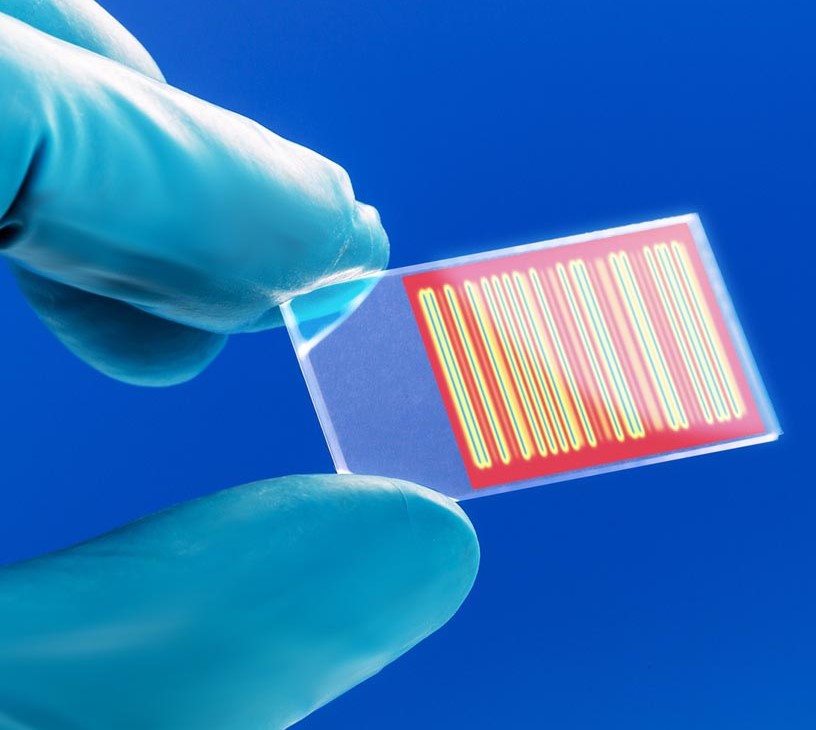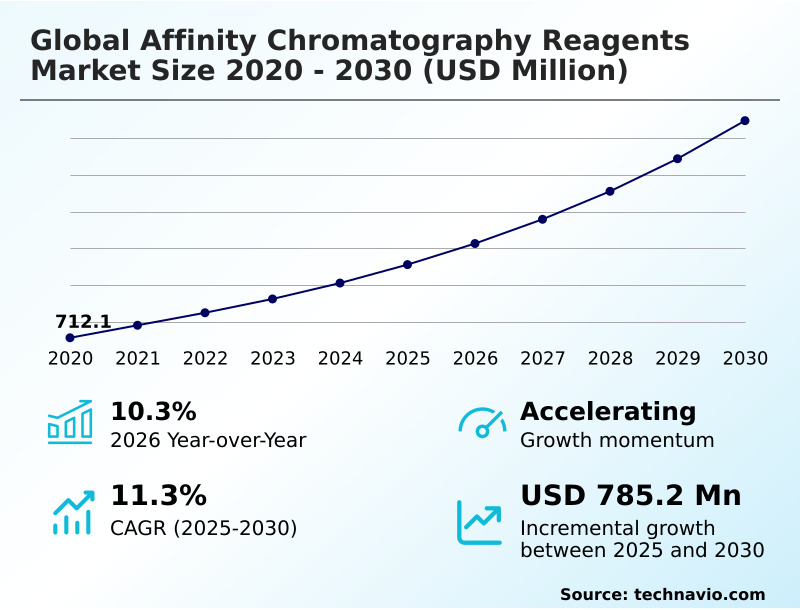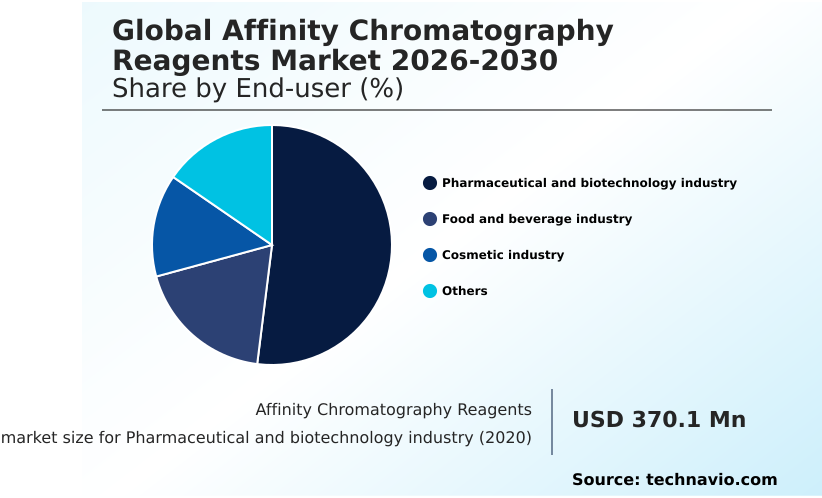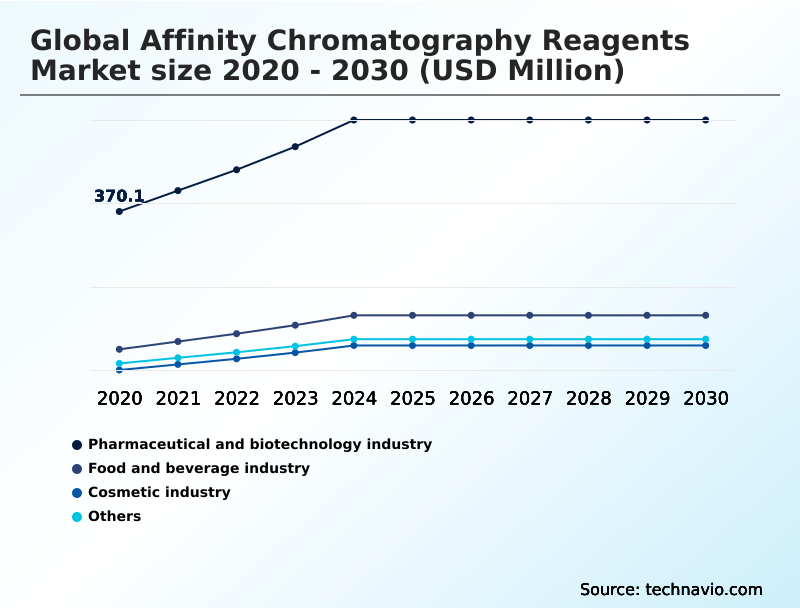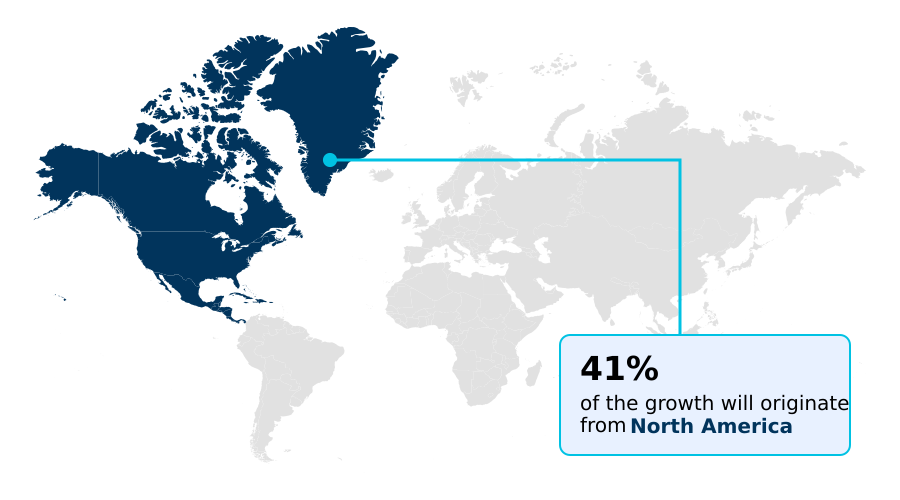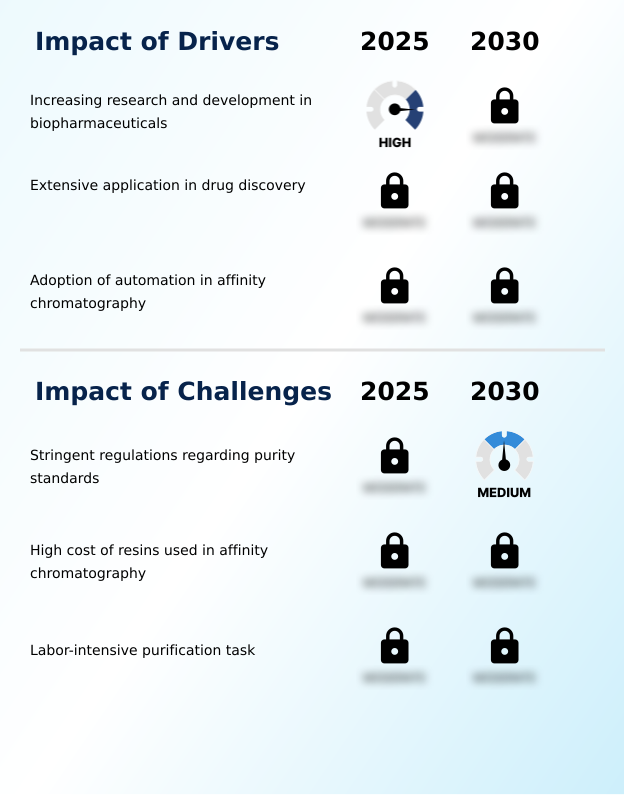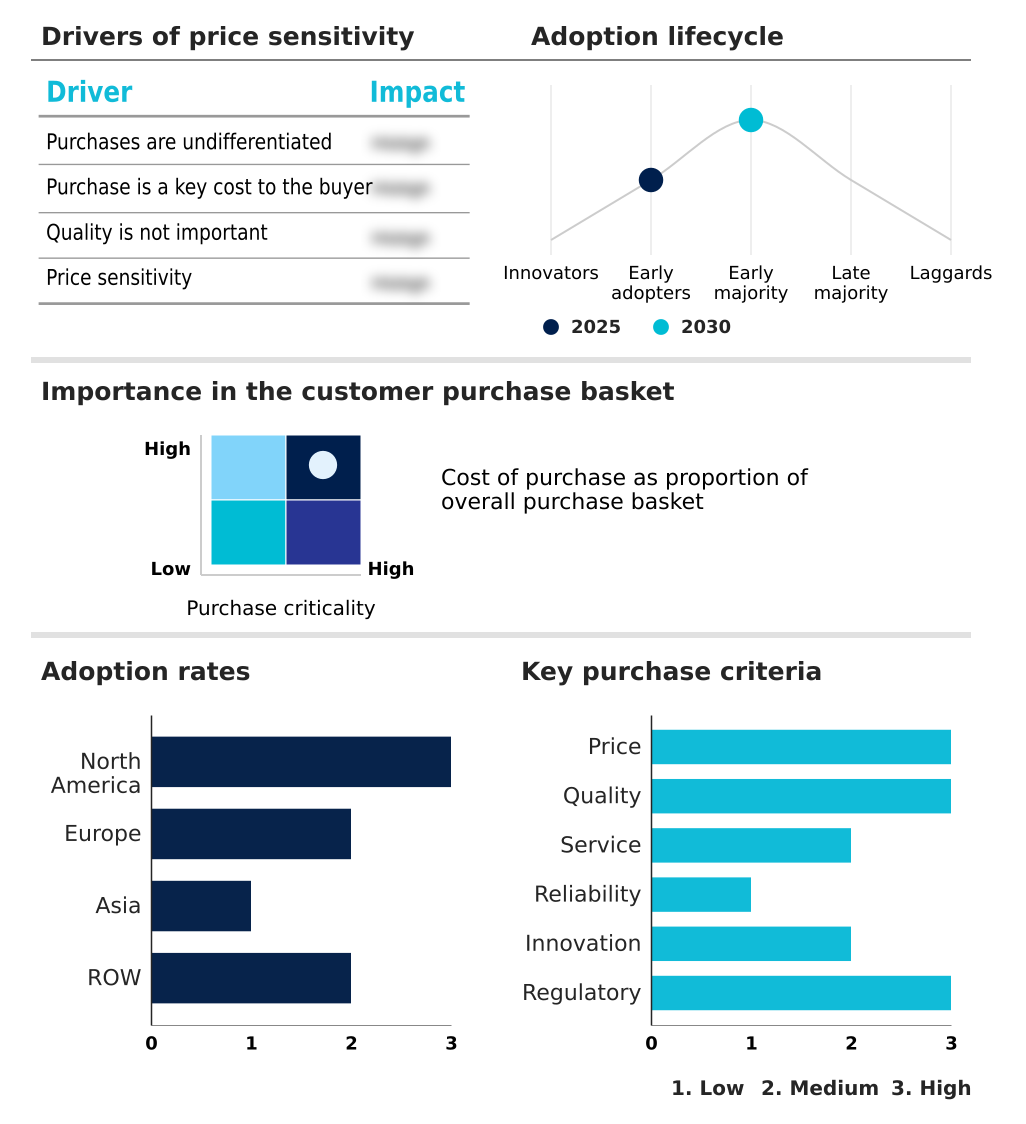Affinity Chromatography Reagents Market Size 2026-2030
The affinity chromatography reagents market size is valued to increase by USD 785.2 million, at a CAGR of 11.3% from 2025 to 2030. Increasing research and development in biopharmaceuticals will drive the affinity chromatography reagents market.
Major Market Trends & Insights
- North America dominated the market and accounted for a 41.3% growth during the forecast period.
- By End-user - Pharmaceutical and biotechnology industry segment was valued at USD 526.9 million in 2024
- By Application - Analytical chromatography reagents segment accounted for the largest market revenue share in 2024
Market Size & Forecast
- Market Opportunities: USD 1.18 billion
- Market Future Opportunities: USD 785.2 million
- CAGR from 2025 to 2030 : 11.3%
Market Summary
What will be the Size of the Affinity Chromatography Reagents Market during the forecast period?
Get Key Insights on Market Forecast (PDF) Request Free Sample
How is the Affinity Chromatography Reagents Market Segmented?
The affinity chromatography reagents industry research report provides comprehensive data (region-wise segment analysis), with forecasts and estimates in "USD million" for the period 2026-2030, as well as historical data from 2020-2024 for the following segments.
- End-user
- Pharmaceutical and biotechnology industry
- Food and beverage industry
- Cosmetic industry
- Others
- Application
- Analytical chromatography reagents
- Preparative chromatography reagents
- Product type
- Resins
- Ligands
- Prepacked columns
- Buffers
- Kits
- Geography
- North America
- US
- Canada
- Mexico
- Europe
- Germany
- France
- UK
- Asia
- Rest of World (ROW)
- North America
By End-user Insights
The pharmaceutical and biotechnology industry segment is estimated to witness significant growth during the forecast period.
The Pharmaceutical and biotechnology industry segment was valued at USD 526.9 million in 2024 and showed a gradual increase during the forecast period.
Regional Analysis
North America is estimated to contribute 41.3% to the growth of the global market during the forecast period.Technavio’s analysts have elaborately explained the regional trends and drivers that shape the market during the forecast period.
See How Affinity Chromatography Reagents Market Demand is Rising in North America Request Free Sample
Market Dynamics
Our researchers analyzed the data with 2025 as the base year, along with the key drivers, trends, and challenges. A holistic analysis of drivers will help companies refine their marketing strategies to gain a competitive advantage.
What are the key market drivers leading to the rise in the adoption of Affinity Chromatography Reagents Industry?
What are the market trends shaping the Affinity Chromatography Reagents Industry?
What challenges does the Affinity Chromatography Reagents Industry face during its growth?
Exclusive Technavio Analysis on Customer Landscape
The affinity chromatography reagents market forecasting report includes the adoption lifecycle of the market, covering from the innovator’s stage to the laggard’s stage. It focuses on adoption rates in different regions based on penetration. Furthermore, the affinity chromatography reagents market report also includes key purchase criteria and drivers of price sensitivity to help companies evaluate and develop their market growth analysis strategies.
Customer Landscape of Affinity Chromatography Reagents Industry
Competitive Landscape
Companies are implementing various strategies, such as strategic alliances, affinity chromatography reagents market forecast, partnerships, mergers and acquisitions, geographical expansion, and product/service launches, to enhance their presence in the industry.
Agilent Technologies Inc. -
The industry research and growth report includes detailed analyses of the competitive landscape of the market and information about key companies, including:
- Agilent Technologies Inc.
- AMS Biotechnology Europe Ltd.
- Avantor Inc.
- Bio Rad Laboratories Inc.
- Bio-Works Technologies AB
- Danaher Corp.
- Kaneka Corp.
- Kanto Chemical Co. Inc.
- Merck KGaA
- Promega Corp.
- QIAGEN N.V.
- Regis Technologies Inc.
- Santa Cruz Biotechnology Inc.
- Sartorius AG
- Shimadzu Corp.
- Thermo Fisher Scientific Inc.
- Tosoh Corp.
- Waters Corp.
Qualitative and quantitative analysis of companies has been conducted to help clients understand the wider business environment as well as the strengths and weaknesses of key industry players. Data is qualitatively analyzed to categorize companies as pure play, category-focused, industry-focused, and diversified; it is quantitatively analyzed to categorize companies as dominant, leading, strong, tentative, and weak.
Recent Development and News in Affinity chromatography reagents market
Dive into Technavio’s robust research methodology, blending expert interviews, extensive data synthesis, and validated models for unparalleled Affinity Chromatography Reagents Market insights. See full methodology.
| Market Scope | |
|---|---|
| Page number | 301 |
| Base year | 2025 |
| Historic period | 2020-2024 |
| Forecast period | 2026-2030 |
| Growth momentum & CAGR | Accelerate at a CAGR of 11.3% |
| Market growth 2026-2030 | USD 785.2 million |
| Market structure | Fragmented |
| YoY growth 2025-2026(%) | 10.3% |
| Key countries | US, Canada, Mexico, Germany, France, UK, Italy, Spain, The Netherlands, China, India, Japan, South Korea, Singapore, Indonesia, Brazil, Australia, South Africa, Argentina, Saudi Arabia, UAE, Turkey and Chile |
| Competitive landscape | Leading Companies, Market Positioning of Companies, Competitive Strategies, and Industry Risks |
Research Analyst Overview
What are the Key Data Covered in this Affinity Chromatography Reagents Market Research and Growth Report?
-
What is the expected growth of the Affinity Chromatography Reagents Market between 2026 and 2030?
-
USD 785.2 million, at a CAGR of 11.3%
-
-
What segmentation does the market report cover?
-
The report is segmented by End-user (Pharmaceutical and biotechnology industry, Food and beverage industry, Cosmetic industry, and Others), Application (Analytical chromatography reagents, and Preparative chromatography reagents), Product Type (Resins, Ligands, Prepacked columns, Buffers, and Kits) and Geography (North America, Europe, Asia, Rest of World (ROW))
-
-
Which regions are analyzed in the report?
-
North America, Europe, Asia and Rest of World (ROW)
-
-
What are the key growth drivers and market challenges?
-
Increasing research and development in biopharmaceuticals, Stringent regulations regarding purity standards
-
-
Who are the major players in the Affinity Chromatography Reagents Market?
-
Agilent Technologies Inc., AMS Biotechnology Europe Ltd., Avantor Inc., Bio Rad Laboratories Inc., Bio-Works Technologies AB, Danaher Corp., Kaneka Corp., Kanto Chemical Co. Inc., Merck KGaA, Promega Corp., QIAGEN N.V., Regis Technologies Inc., Santa Cruz Biotechnology Inc., Sartorius AG, Shimadzu Corp., Thermo Fisher Scientific Inc., Tosoh Corp. and Waters Corp.
-
Market Research Insights
We can help! Our analysts can customize this affinity chromatography reagents market research report to meet your requirements.
